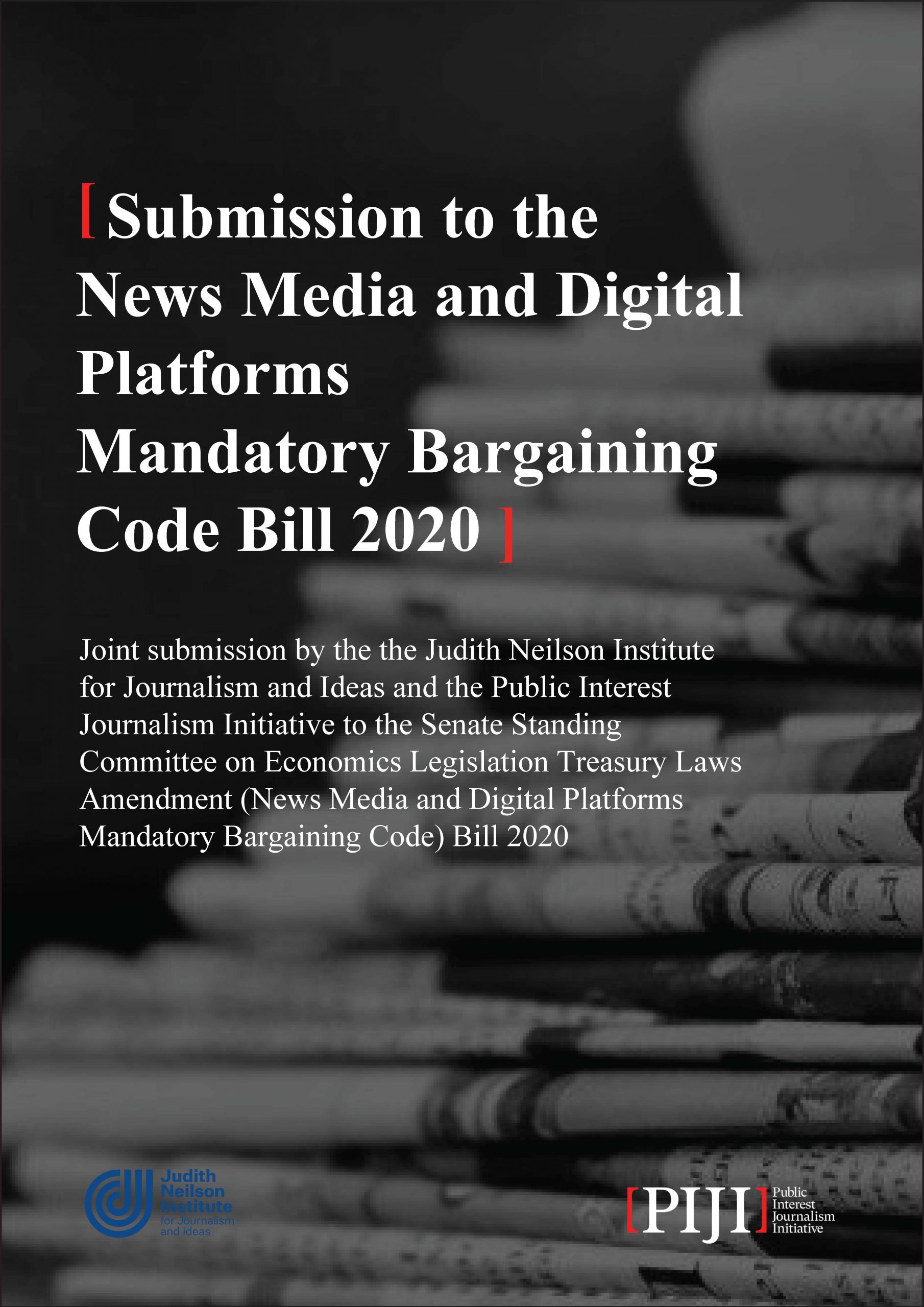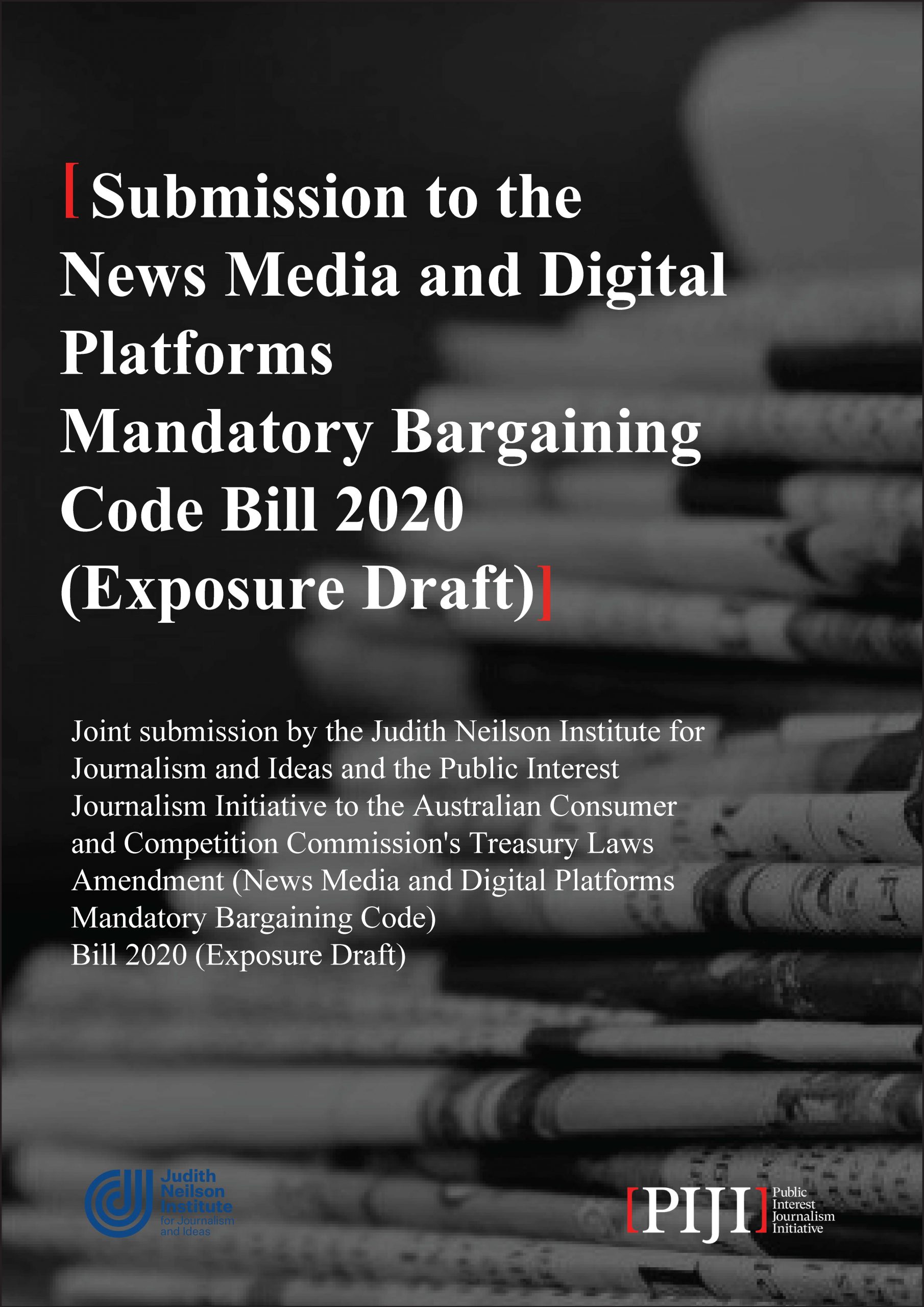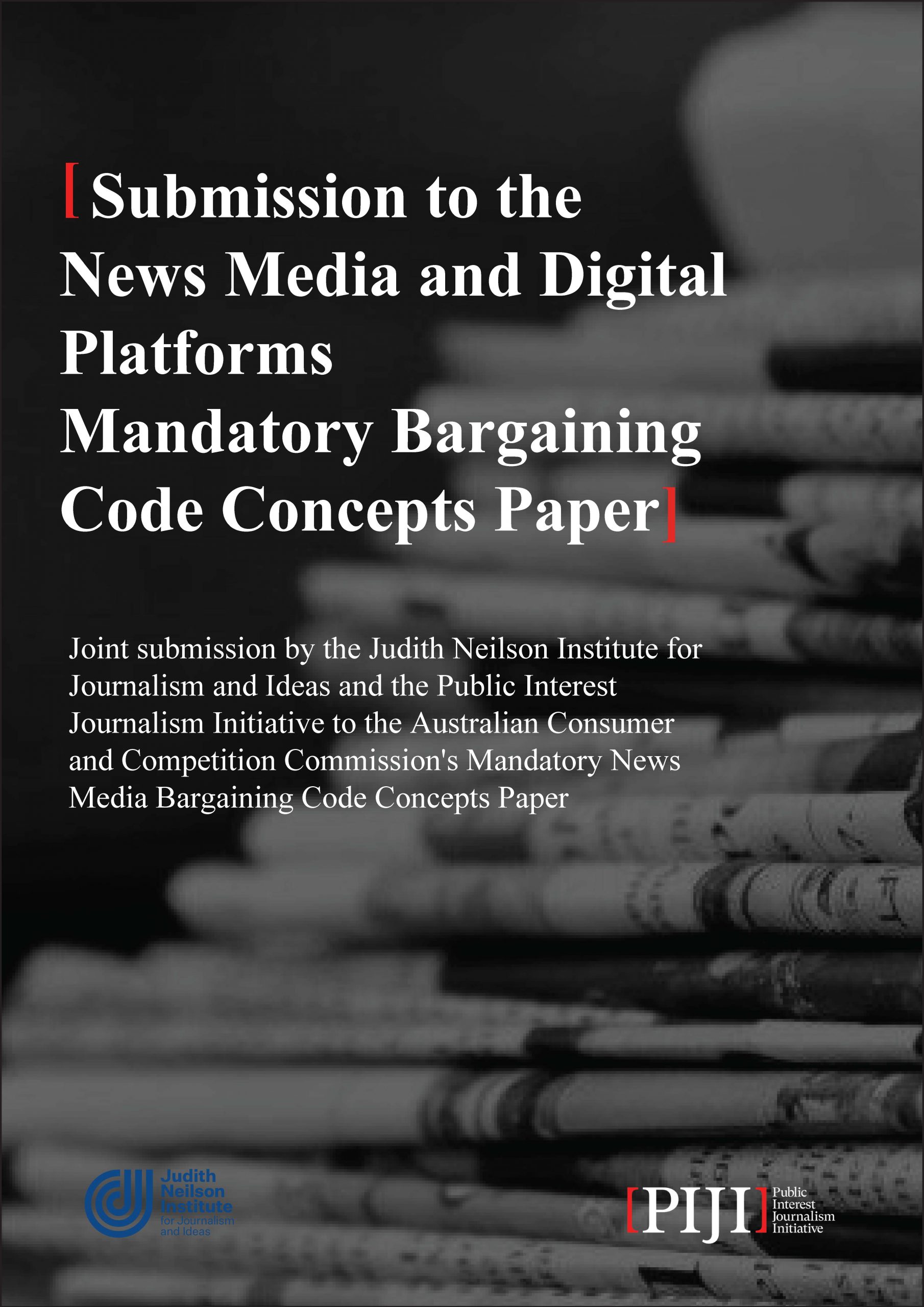News Media and Digital Platforms Mandatory Bargaining Code
The News Media and Digital Platforms Mandatory Bargaining Code is global first legislation passed in May 2021, intended to address the market power imbalance between Australian news media businesses and digital platforms.
PIJI led a collaborative joint project with the Judith Neilson Institute for Journalism and Ideas (JNI) that included various consultations and submissions during the legislation’s development:
- Submission to the Treasury Laws Amendment (News Media and Digital Platforms Mandatory Bargaining Code) Bill 2021, January 2021.
- Submission to the Treasury Laws Amendment (News Media and Digital Platforms Mandatory Bargaining Code) Bill 2020 (Exposure Draft), August 2020.
- Submission to the Mandatory News Media Bargaining Code Concepts Paper, June 2020.
PIJI has recommended complementary policy measures to sit alongside the Code including tax rebates, and philanthropic incentives for public interest journalism.
Submission to the Treasury Laws Amendment (News Media and Digital Platforms Mandatory Bargaining Code) Bill 2021
January 2021
PIJI and JNI’s joint Submission to the Treasury Laws Amendment (News Media and Digital Platforms Mandatory Bargaining Code) Bill 2020 made the following recommendations:
- The ACCC should closely monitor the operations of the Code, including interpretations of its key terms and examples.
- The professional standards test for news media businesses should be amended to require that they are subject to an external complaints process.
- The Minister should review the designated digital platforms that are subject to the Code every 12 months.
- The Government should revisit the minimum standards relating to user comments, changes to the display of content and service opt-outs, for future iterations of the Code.
Treasury Laws Amendment (News Media and Digital Platforms Mandatory Bargaining Code) Bill 2021
A Bill to implement the News Media and Digital Platforms Mandatory Bargaining Code was introduced to the House of Representatives in December, 2020. The Bill was then referred to the Senate Economics Legislation Committee for inquiry and report. The Code came into effect on 2 March 2021.
Key Documents
Treasury Laws Amendment (News Media and Digital Platforms Mandatory Bargaining Code) Bill 2021, The Parliament of the Commonwealth of Australia, House of Representatives, December 2020
Submissionto the Treasury Laws Amendment (News Media and Digital Platforms Mandatory Bargaining Code) Bill 2020, Public Interest Journalism Initiative, January 2021
This joint PIJI-JNI submission was developed by PIJI’s Policy Working Group and the Joint Project Team:
- PIJI Board directors – Professors Allan Fels AO and Professor the Honourable Marilyn Warren AC QC
- External members – Professor Simon Wilkie and Richard Eccles
- Anna Draffin, Chief Executive Officer, Public Interest Journalism Initiative
- Gary Dickson, Research and Projects Manager, Public Interest Journalism Initiative
- Mark Ryan, JNI Executive Director
- Consultants from the University of Technology Sydney (UTS) – Dr Karen Lee, Senior Lecturer, Faculty of Law, and Sacha Molitorisz (post-doctoral research fellow at the Centre for Media Transition).
The joint PIJI-JNI submission was approved by the PIJI Policy Working Group.
Within JNI, the submission was reviewed and approved by:
- Mark Ryan, JNI Executive Director
Submission to the Treasury Laws Amendment (News Media and Digital Platforms Mandatory Bargaining Code) Bill 2020 (Exposure Draft)
August 2020
PIJI and JNI’s joint Submission to the Treasury Laws Amendment (News Media and Digital Platforms Mandatory Bargaining Code) Bill 2020 (Exposure Draft) made a total of 28 recommendations seeking to ensure greater clarity and equality within the proposed legal framework of the Mandatory News Media Bargaining Code. These recommendations include:
- Further value guidance around how payment outcomes will be determined.
- Addressing potential inequities for small to medium news businesses.
- Inclusion of ABC and SBS content, with any proceeds flowing to a public interest journalism fund.
- Participant news organisations to meet professional standards of practice.
- More detail and clarity around the definition of news and who produces it.
- The appointment of an independent third party to lead simple lump sum negotiations between digital platforms and smaller players.
- Initiatives complementary to the code, including a mix of industry, philanthropic, and governmental levers.
Treasury Laws Amendment (News Media and Digital Platforms Mandatory Bargaining Code) Bill 2020 (Exposure Draft)
In July 2020 the Australian Competition and Consumer Commission released an exposure draft of the News Media and Digital Platforms Mandatory Bargaining Code on for industry response.
The Public Interest Journalism Initiative partnered with the Judith Neilson Institute for Journalism and Ideas on a joint response informed consulting widely across industry from an independent, research-driven position.
Key Documents
Submission to the Treasury Laws Amendment (News Media and Digital Platforms Mandatory Bargaining Code) Bill 2020 (Exposure Draft), Judith Neilson Institute for Journalism and Ideas, and Public Interest Journalism Initiative, August 2020
News Media and Digital Platforms Mandatory Bargaining Code (Exposure Draft) Australian Competition and Consumer Commission , 31 July 2020
This joint PIJI-JNI submission was developed by PIJI’s Policy Working Group and the Joint Project Team:
- PIJI Board directors – Professors Allan Fels AO and Professor the Honourable Marilyn Warren AC QC
- External members – Professor Simon Wilkie and Richard Eccles
- Anna Draffin, Chief Executive Officer, Public Interest Journalism Initiative
- Gary Dickson, Research and Projects Manager, Public Interest Journalism Initiative
- Mark Ryan, JNI Executive Director
- Consultants from the University of Technology Sydney (UTS) – Dr Karen Lee, Senior Lecturer, Faculty of Law, and Sacha Molitorisz (post-doctoral research fellow at the Centre for Media Transition).
The joint PIJI-JNI submission was approved by the PIJI Policy Working Group.
Within JNI, the joint PIJI-JNI submission was reviewed and approved by:
- Jim Spigelman, Chairman of JNI
- Jonathan Teperson, Chairman of the Finance Committee of the board of JNI
Submission to the Mandatory News Media Bargaining Code Concepts Paper
June 2020
The PIJI-JNI joint Submission to the Mandatory News Media Bargaining Code Concepts Paper highlights the following areas of key concern:
- Definitions of news and public interest journalism
- The inclusivity of the code, particularly its bargaining framework, in terms of all manner of participants in the news media ecosystem
- Data sharing, algorithmic transparency
- Code monitoring, enforcement and revision
- A pragmatic distribution model based on investment dollars in news, while a more precise formula is developed.
The submission also recognised the need for other policy reform measures beyond the code to ensure public interest journalism has a sustainable future in Australia.
Mandatory News Media Bargaining Code Concepts Paper
In July 2019, the Australian Competition and Consumer Commission (ACCC)’s Digital Platforms Inquiry identified a fundamental bargaining power imbalance between Australian news media and major digital platforms:
In May 2020, the ACCC released a Mandatory News Media Bargaining Code Concepts Paper for industry comment.
The Public Interest Journalism Initiative partnered with the Judith Neilson Institute for Journalism and Ideas on a joint response informed by wide consultation across the news media industry, digital platforms, sector peak bodies and community organisations.
Key Documents
Submission to the Mandatory News Media Bargaining Code Concepts Paper, Judith Neilson Institute for Journalism and Ideas, and Public Interest Journalism Initiative, June 2020
Mandatory News Media Bargaining Code Concepts Paper, Australian Competition and Consumer Commission, July 2019
This joint PIJI-JNI submission was developed by PIJI’s Policy Working Group and the Joint Project Team:
- PIJI Board directors – Professors Allan Fels AO and Professor the Honourable Marilyn Warren AC QC
- External members – Professor Simon Wilkie and Richard Eccles
- Anna Draffin, Chief Executive Officer, Public Interest Journalism Initiative
- Gary Dickson, Research and Projects Manager, Public Interest Journalism Initiative
- Mark Ryan, JNI Executive Director
- Consultants from the University of Technology Sydney (UTS) – Dr Karen Lee, Senior Lecturer, Faculty of Law, and Sacha Molitorisz (post-doctoral research fellow at the Centre for Media Transition).
The joint PIJI-JNI submission was approved by the PIJI Policy Working Group.
Within JNI, the joint PIJI-JNI submission was reviewed and approved by:
- Jim Spigelman, Chairman of JNI
- Jonathan Teperson, Chairman of the Finance Committee of the board of JNI


